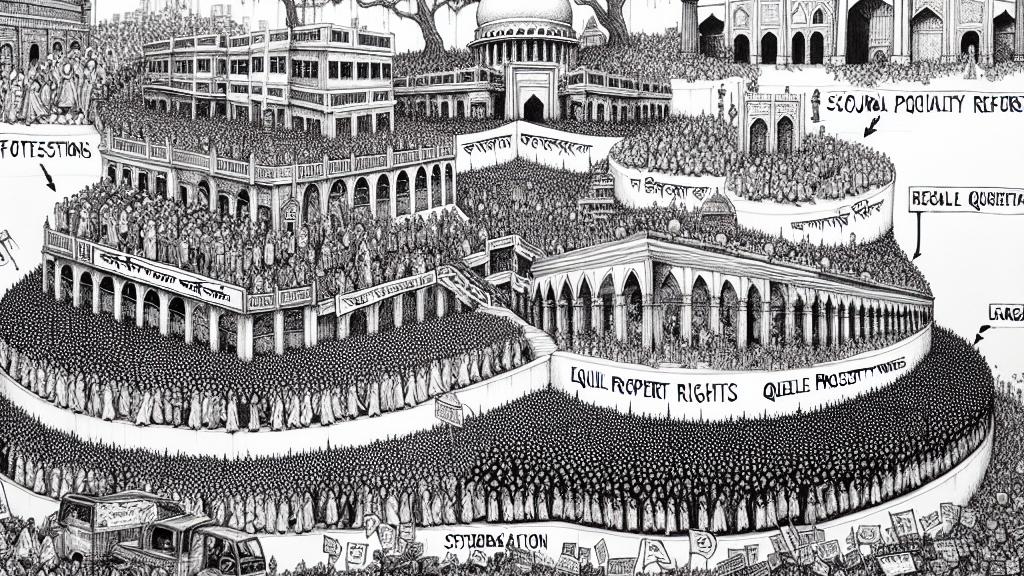Hefazat-e-Islam: The Rise of Hardline Islamists in Bangladesh
Overview
- Hefazat-e-Islam has evolved into a powerful force within Bangladesh's tumultuous political arena, illustrating significant ideological divides.
- The group has aggressively promoted strict interpretations of Islamic law, engaging in numerous public protests that have often turned violent.
- Under the current interim government led by Muhammad Yunus, Hefazat has gained unprecedented influence, potentially reshaping the nation’s secular identity.

The Evolving Political Landscape of Bangladesh
The emergence of Hefazat-e-Islam is a striking testament to the shifting political landscape in Bangladesh. Founded in 2010 as a response to the secular policies of the Awami League, the group initially focused on resisting reforms that they saw as undermining Islamic values, particularly those aimed at promoting gender equality. A notable example is their fervent opposition to the Women’s Bill, which sought to ensure equal property rights for women. As we look back, during Sheikh Hasina's tenure, Hefazat organized massive protests, mobilizing thousands of madrassa students to take to the streets. Fast forward to 2024, and the political landscape has changed once again. Under the interim leadership of Muhammad Yunus, Hefazat has woven itself more deeply into the fabric of governance, securing the appointment of its leaders to influential roles. This integration suggests a precarious balancing act—one that could destabilize the democratic ideals upon which Bangladesh was founded.
Hefazat-e-Islam's Aggressive Agenda and Actions
Hefazat-e-Islam’s ambitions reflect a determination to enforce an uncompromising version of Islamic law in Bangladesh. Their agenda is multifaceted, targeting not just women's rights but also broader cultural expressions deemed contrary to Islamic teachings. For instance, their vehement campaigns against public statues stem from a belief that such symbols contradict Islamic tenets. This was dramatically illustrated during protests against Indian Prime Minister Modi's visit in 2021, where violent clashes erupted, exposing a deep-seated anger over perceived external threats to Islam and resulting in significant injuries and fatalities. This incident serves as a chilling reminder that Hefazat’s capacity for mobilization can spark chaos, revealing the social fractures within a nation at a crossroads between tradition and modernity. Indeed, the group's ability to mobilize large crowds speaks volumes about the undercurrents of dissatisfaction and the yearning for a return to a more conservative interpretation of society.
The Future of Secularism in Bangladesh: A Looming Crisis?
As Hefazat-e-Islam’s power grows, the prospects for secularism in Bangladesh become increasingly uncertain. The government’s willingness to accommodate extremist groups raises serious concerns for secular citizens and progressive advocates who fear a shift toward religious fundamentalism. The targeted assassinations of secular bloggers illustrate a dangerous trend whereby dissenting voices are silenced. For example, the horrifying attacks on intellectuals from 2013 to 2016, where several prominent figures lost their lives to extremism, highlight the stakes at play. Moreover, as Hefazat gains political leverage, the potential for implementing laws that enforce strict adherence to Sharia principles becomes a real threat. This gradual encroachment upon Bangladesh’s secular foundation represents a profound challenge; one that could redefine the very essence of a country celebrated for its diversity and religious tolerance. Urgent dialogue and civic engagement are imperative to safeguard democracy and ensure that the pluralistic ideals are not merely relics of the past but continue to thrive in the face of rising extremism.

Loading...